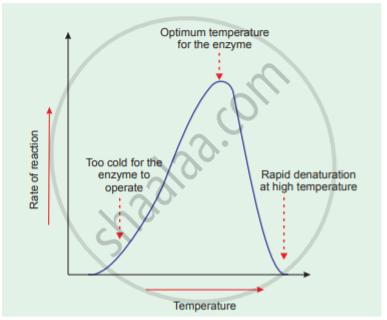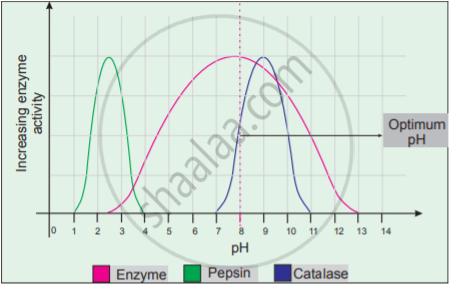Advertisements
Advertisements
प्रश्न
What are the factors affecting the rate of enzyme reaction?
दीर्घउत्तर
उत्तर
- Temperature: Heating increases molecular motion. Thus the molecules of the substrate and enzyme move more quickly resulting in a greater probability of occurrence of the reaction. The temperature that promotes maximum activity is referred to as optimum temperature.

- pH: The optimum pH is that at which the maximum rate of reaction occurs. Thus the pH change leads to an alteration of enzyme shape, including the active site. If extremes of pH are encountered by an enzyme, then it will be denatured.

- Substrate Concentration: For a given enzyme concentration, the rate of an enzyme reaction increases with increasing substrate concentration.
- Enzyme Concentration: The rate of reaction is directly proportional to the enzyme concentration.

Rate of enzyme reaction
The Michaelis – Menton Constant (Km) and Its Significance:
When the initial rate of reaction of an enzyme is measured over a range of substrate concentrations (with a fixed amount of enzyme) and the results are plotted on a graph. With increasing substrate concentration, the velocity increases – rapidly at lower substrate concentrations. However, the rate increases progressively, above a certain concentration of the substrate the curve flattened out. No further increase in rate occurs. This shows that the enzyme is working at maximum velocity at this point. On the graph, this point of maximum velocity is shown as VMax.
shaalaa.com
या प्रश्नात किंवा उत्तरात काही त्रुटी आहे का?
APPEARS IN
संबंधित प्रश्न
Protein part of the enzyme is known as ______.
The word 'enzyme' refers to ______.
Study the following statements and select correct option.
Statement I: Removal of co-factors from the enzyme disrupts the catalytic activity of the enzyme.
Statement II: Prosthetic groups bound tightly to apoenzymes in order to make them catalytically active.
Prosthetic groups differ from co-enzymes in that-
NADP is ____________.
The rate of enzyme reactions rises with the increase in substrate concentration. But it does NOT increase beyond a certain concentration because ______
Enzymes can react with acidic or basic substances due to their ______ nature.
Enzyme sucrase belongs to which one of the following classes?
Which of the following is a coenzyme?
Enzymes, vitamins and hormones can be classified into a single category of biological chemicals, because all of these ______.
